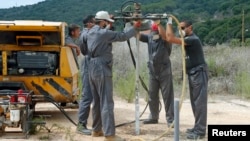In a country blighted by power cuts and poor infrastructure -- and struggling under the impact of the Syrian war across its border -- Lebanon is hopeful that untapped oil and gas reserves may offer some relief.
Although proper exploration of the possible reserves is being stymied by political deadlock, estimates have suggested revenue from the reserves could yield as much as $600 billion.
Foreign Minister Gebran Bassil, who once served as Lebanon's energy minister, has claimed such a find would help bring economic independence to the country, enabling it to enter “the club of oil states” and improve life for its citizens. Others are not so sure.
Effective regulation
For Lebanese Center for Policy Studies [LCPS] director Sami Atallah, whose organization is keeping a close eye on developments, the benefits of any discovery are far from guaranteed.
He said that while a properly regulated oil-and-gas industry could lead to a “new dawn” for Lebanon, it also could have the opposite effect. Atallah warns that a vast influx of money, fueled by a lack of transparency and a weak state could result in corruption and a poor distribution of wealth.
Lebanon, with a weak state and political power consciously divided along sectarian lines, has no “role model” in the region to follow with regard to the transparency and accountability needed to ensure any gains ultimately help the country, said Laury Haytayan of the Natural Resource Governance Institute.
“In Lebanon you do not have one person deciding, you have many decision makers, all with an interest and a confessional background,” Haytayan said. “When the institutions are really weak this is when it’s alarming.”
Rising corruption
Public cynicism about the development of an effective and fair way to exploit possible reserves is understandable. In December, Lebanon dropped nine places to 136th out of 175 in Transparency International’s annual survey on perceptions of public sector corruption, placing it alongside the likes of Nigeria and Kyrgyzstan.
But, civil society organizations are mobilizing to make sure revenue from the country’s natural resources are not misused.
Mona Sukkarieh, co-founder of Middle East Strategic Perspectives, said these organizations in Lebanon already have started to scrutinize the process and are “expected to take increased interest in petroleum issues.” They are likely to “gradually become more autonomous,” she said, “with the availability of foreign funding representing a real incentive to get more and more involved.”
With local media paying an increasingly close interest in the situation, local organizations such as LCPS are joining forces to engage with energy sector authorities and possibly form a single organization to oversee the energy sector. Among those backing the move are the Norwegian and British governments, the latter of which is providing funding of about $115,000.
“We will need a lot of expertise, but we are seeing a high amount of interest,” Atallah said. “As for our ability to influence things, that is a whole different animal, and we will have to resort to all sorts of tools or ways to penetrate the system in order to influence it.”
Atallah, like many others looking to scrutinize the industry from outside of the government system, acknowledged it will be an uphill struggle.
The Petroleum Administration Lebanon [LPA], which was set up by the government in 2012 to oversee the process, initially surprised many with its transparency and effective handling of the early stages of processing energy company bids to explore possible reserves.
But while the LPA has engaged with civil society groups, Middle East Strategic Perspectives’ Sukkarieh said the impact of these civil society groups on the political process is “relatively limited.”
Persistence pledge
Those fighting for transparency will not be put off that easily. Diana Kaissy is the Middle East and North Africa coordinator at Publish What You Pay, a global network of civil society organizations dedicated to ensuring citizens benefit from the extraction of their country’s natural resources. When she took on her role in 2012 the situation within Lebanon seemed “desperate”, she said, but things are changing.
“There has been a great shift in attitude among both NGOs and society around Lebanon, and though we need to push that further we are on the right track,” said Kaissy.
Natural Resource Governance Institute’s Haytayan points out that even if oil and gas is discovered, the efforts of those battling for transparency are at the mercy of those in power.
“It goes back to political will, and if they want to do business as usual or use the opportunity of the sector to do things differently” she said. “This goes beyond oil and gas -- the sector could be used to rebuild trust in the government.”
Editor's note: This article originally contained unattributed material inadvertently added during the editing process from an online report that appeared in Al-Monitor.




